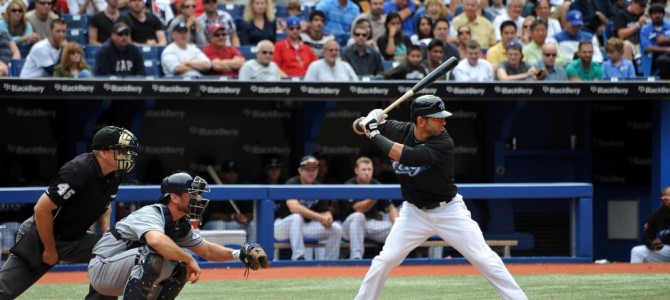
Of all the sports Americans revere, baseball’s relationship to on-field fighting is unique. Baseball joins hockey as one of the only sports that provide for fighting on the field, but is different from hockey in that fighting is not so much sanctioned as it is merely tolerated. Baseball lets the guys throw some (mostly half-hearted) punches and the officials sort it out later.
The 2016 baseball season is young but has already seen some memorable fights. On May 7, the first-place White Sox were playing the last-place Twins in Chicago. Sox slugger Jose Abreu was beaned by a pitch, and the benches cleared. The game stopped for about ten minutes to let things cool off.
But the fight that got the most headlines was one between Rougned Odor of the Texas Rangers and Jose Bautista of the Blue Jays. Odor socked Bautista in the jaw in a swing worthy of a boxing champion. The fight is not without context, and the causes reach back to last year’s playoffs, when Bautista upstaged the Rangers after launching a monster home run and flipping his bat almost as far. Bautista clearly violated baseball etiquette with his bat flip, hence the retaliatory fight.
¯\_(ツ)_/¯ pic.twitter.com/EFOP2OTQCU
— José Rivera (@whoisjoserivera) May 15, 2016
Unwritten Rules Are Important
Baseball, like the rest of human society, has written rules and unwritten rules, and the two sets of strictures reinforce each other. While the voluminous written rule book of baseball gives us, in theory, all we need to play the game, ignoring the unwritten rules would mean missing something essential about how the game has always been played.
Like practitioners of an ancient honor code, old-school players struggle to conform the demands of baseball’s unwritten rules to written rule changes demanded by the game’s owners and commissioner. The struggle is not new. In baseball’s early days, a pitcher who intentionally threw at a batter would expect to see the same coming his way when it was his turn at the plate. Adding the designated hitter to the American League in 1969 disrupted this balance. AL pitchers could plunk opponents with relative impunity, or at least with personal impunity, as one of the pitcher’s teammates would absorb the punishment instead.
The increasing profitability in the game also shifted its mores, as owners now seek ways to protect their star players from injuries, rather than treating them as expendable cogs in the machine, as they did in the deadball era. Owners once felt as honor-bound by the unwritten rules as the players did; with multi-million dollar guaranteed contracts, their primary concern shifted to keeping their players healthy and productive. From a corporate profit perspective, beanballs and takeout slides look as antiquated and irrational as duels. But an economic argument is not the same as a moral argument.
Bat flips, intentional hits by pitchers, and beanball wars are hallmarks of baseball and the game’s unwritten rules. Baseball has a lot of arcane rules, but none of the obvious offenses are codified. Beanball wars, for example, are not expressly prohibited, although there are now rules to guide the umpires in dealing with them. Bat flips are not forbidden either, in any form, and there are no rules to penalize a player who upstages the other team, as Bautista did in last season’s playoffs.
Why Baseball Needs Unwritten Rules
Baseball is a game unlike any other in a way that is difficult to quantify but can be summed up thusly: the season is long (162 games across six months), it is played (mostly) outdoors in the hottest months of the year, days off are few and far between, and the season is, essentially, a grind.
The players themselves tend to be unique in personality among professional athletes. They are simultaneously mellow, exotic, on fire, and slumping. Further, there is the etiquette of the game that has developed over the 150 years of baseball’s existence, and which no rule book will ever overrule. Combine these factors and the result is a slow-motion war between teams that can boil over into conflict that leaps off the field.
Baseball’s unwritten rules come under fire from purists and reformists alike but they serve an essential purpose: protecting the team from dishonor, showmanship, or both. Other sports (except hockey) don’t have such a system because they don’t need such a system. In basketball the best way to silence an opponent is to dunk over him. In football, it’s scoring a crucial touchdown or field goal. In baseball, it’s beaning a batter or charging the mound.
If this sounds old-school, it’s because it is. Sports inherit many of the traits of the societies that create them. Baseball was born in Civil War-era America, and inherits much of the honor-based culture of that time. In our modern society, honor may have given way to more universal ideas about dignity — no one fights duels anymore, for example — but in baseball, where major league players occupy an elite place at the sport’s pinnacle, honor survives and even thrives.
Owners concerned about protecting their “investment” will continue to try to stamp out baseball’s honor culture and the violence inevitably associated with it. One day, they may even succeed. For now, though, baseball is one of the few remaining preserves of an old-time American ideal where men would rather “settle things outside” than through prolix rules constructed through collective bargaining agreements.
The rules are important. Players and owners respect the rules, and the umpires and commissioners who enforce them. But sports, like society, is not governed by written rules alone. Let ballplayers fight.









